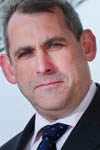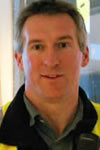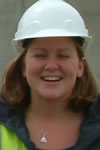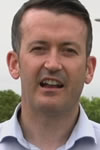Ask me a question!
What were the main 'career decision' milestones in your life so far?
A few things stand out as shaping the direction of my career as Clinical Psychologist. From an early age I sensed that I was suited a career focused on people. I developed childhood friendships with children with intellectual disabilities as myself and my cousin used to play with the children who lived in a local residential centre – they had play areas which were much cooler than anything we knew!
My interest in people continued as a teenager and I experienced as much as I could of other cultures during school and college summers – working on a farm in France, as au pair in Spain, and in a biscuit factory in Germany!
My interest in how individuals and cultures tick was really expanded after my undergraduate degree while teaching in Japan on the Japan Exchange and Teaching (JET) Programme. The experience of living and teaching in Japan was very significant in my decision to train as a Clinical Psychologist as it confirmed for me that my interest in people was probably never ending, and that I was suited to a job focused on working with people day in day out. On my return to Ireland I secured a “front line” post in intellectual disability services before I applied to study on a postgraduate course in Psychology.
I felt it was important to have direct experience in intellectual disability services so that my career decision was based on “evidence”, rather than any unfounded illusions I had! I decided to work on a relief panel (where you rotate around different parts of the service) rather than in one place only. This allowed me to experience a wide range of ages (from babies to older people) and services (residential, respite, special school). I also worked in three different Dublin based services so that I could get direct experience of the differences and similarities between services.
Who are the people who most influenced your career direction?
As mentioned above, straight after my undergraduate degree in college I went to be a teacher in the countryside in Japan on the Japan Exchange and Teaching (JET) programme where I was partnered in the classroom with a Japanese teacher who was usually an elderly man who was half teacher – half farmer!
The students in my class really influenced my decision to train as a Clinical Psychologist as the classes were small (usually eight students) and I really got to know them well, and got an insight into developmental stages, styles of learning, and the challenges of growing up, and integrating into a peer group.
Although I loved teaching for that brief period, the experience reflected to me my desire to work with people in a way which extended beyond the classroom and education needs.
How did you go about getting your current job?
I worked “front line” as a Care Assistant at the beginning of my “route” to becoming a Clinical Psychologist. One of the organisations I worked in was St Michael’s House. Right from the beginning I had huge respect for the way this service was run. I felt the staff interacted with people in a way which was very dignified and enabling.
I learnt so much about the area and myself. I decided then that I would really try to become part of the organisation when I’d qualified as a Clinical Psychologist. Then an opportunity arose to involve St Michael’s House in some research I did as part of my training. This gave me more links with the organisation, and at this time I also heard that the organisation was going to be recruiting Clinical Psychologists at my grade.
I applied for the post following a newspaper advertisement, and also on the organisation’s web site. I was interviewed by a panel and was delighted to be offered the post of Clinical Psychologist in the organisation.
Describe a typical day?
I typically work a regular weekday, however I like the flexibility that my job as Clinical Psychologist allows. Sometimes I might arrive in earlier, for example, to prepare for a Memory Clinic for older people with dementia. Other days I might stay a bit later if we’re running a Parenting Skills Group, for example.
On a usual day I come into my clinic-based office and check phone or email messages and respond to them. Then I might have a Clinic Team Meeting which is where members of the multi-disciplinary team (e.g. Social Worker, Psychiatrist, Occupational Therapist) meet to discuss referrals or ongoing clinical work. Then I might have an appointment with someone either for assessment (e.g. a cognitive assessment or IQ test) or therapy (e.g. psychotherapy).
In the afternoon I might have appointments out in the community, for example, with a teacher in a special school about a particular student, or in a residential home with a Social Care Worker about someone living there. A regular part of my work throughout the week involves reviewing research studies and programmes as part of my planning clinical interventions for individual people or situations.
Once a week I have a meeting with my Head of Department where we review the people and cases on my ‘caseload’ and I find this meeting very useful. At the end of the day I spend some time writing up my clinical notes, scoring up any assessments I did that day, liaising with my colleagues around any tasks that came out of my work that day, and finally planning my work schedule for the next day. Then I leave the Clinic to enjoy my evening!
What are the main tasks and responsibilities?
I’m involved in psychological assessment which involves using tried and tested questionnaires to investigate a difficulty someone has e.g. memory problems, mental health difficulties. I can get a clear idea of the person’s difficulty and also compare how the person is doing compared to other people of his or her age.
As part of the psychological assessment I also complete a clinical interview with significant other people in the person’s life, e.g. family members or staff. Then I use a special psychological framework to “formulate” or tentatively explain why the person might be having the difficulty. This allows me to look at research studies and interventions as part of designing a way of working with the person (and other people with their consent) to overcome the difficulty.
Another area in my work is carrying out evaluations and research into issues, e.g. support needs of parents, so that suitable services can be developed based on accurate information. Other times we may evaluate how a service or group is meeting its aims so that we can confirm that resources are being used effectively. These days resources are scarce so we need to make sure that money and time is being used well!
What are the main challenges?
Maintaining the attention of a playful and curious little child for the purpose of psychological assessment is certainly a challenge! Understanding the speech of a person with communication difficulties also sometimes stretches my powers of listening and interpretation.
Working with staff groups who are struggling to understand and meet the needs of their service users sometimes really draws upon my abilities to motivate and explain psychological interventions in clear terms.
Organising and responding to referrals tests my capacity to gather information and prioritise effectively. The hugely varied nature of human behaviour, psychological difficulties, and the constant research activity means that I need to keep up to speed with developments in the field by reading psychological journals, attending special interest groups, and conferences.
What particular skills do you bring to your workplace?
The particular skills I bring to my role as Clinical Psychologist include my ability to build good rapport with a variety of people in different situations and this helps, for example, in keeping a child’s interest and attention, or sensitively supporting a parent or staff member to talk about their difficulty.
I’m a creative person and this allows me to come up with intervention ideas with are tailored to an individual, and in the case of someone with significant intellectual or sensory disability, this comes in very useful. I also have a good ability to see situations from many perspectives which helps with understanding clinical situations and offering solutions.
I enjoy humour and seeing the lighter side of most situations, and this helps me put people at ease, and also keep up-beat in sometimes challenging situations. I can also adapt to the pace of different individuals, and I believe this comes in particularly useful when working with people who have intellectual disabilities, as some people need significant amounts of time to express themselves or learn a new skill.
I like being organised and this helps me manage a varied and substantial caseload, and prioritise my tasks so that I can address work in a gradual way. I have good attention to detail which helps in the role of Clinical Psychologist in observing body language or group dynamics, as well as rapidly tracking a person’s performance on cognitive tasks.
Finally I have a good attention span and can focus easily which is as useful to sustaining concentration in long therapeutic sessions!
What subjects did you take in school and how have these influenced your career path?
I like the way that the Irish school system allows students to study a variety of subjects to get a broad base.
I chose a range of subjects including languages (French and Spanish) which allowed me to make friends and really immerse myself in different cultures during my summers abroad.
I feel that Maths helped me to develop my logical mind, and prepared me well for learning to use statistics which are widely used in Clinical Psychology.
Biology was certainly useful to take in school and is relevant to Clinical Psychology because of its focus on how the human body works and how the brain functions.
English was also useful to the role of Clinical Psychologist as report writing skills are used across the board, and good ability to express yourself both verbally and in writing is very important.
I also feel that my involvement in school sports (hockey and swimming) was important in helping me develop into a person who enjoys being part of a team.
What is your education to date?
I went to Mount Anville school, starting as a small child in Montessori and finishing as a teenager dying to get out into the ‘real world’ after the Leaving Cert.
Then I did a BA degree in English literature and Philosophy in Trinity College Dublin which honed my understanding of human nature and relationships (English literature) and trained me in logic and the analytic method (Philosophy) – and incidentally these are skills very useful to Clinical Psychology!
After teaching on the JET programme in Japan and having developed the idea to train as a Clinical Psychologist, I completed the Higher Diploma in Psychology (DipPsych) in UCD. This background allowed me to undertake training to be a Clinical Psychologist in University of North Wales (Bangor) while simultaneously completing clinical placements in the NHS in Wales.
What have been the most rewarding events in your career so far?
The rewards have been many and varied in the role of Clinical Psychologist and the years on my “route” to getting there.
I collaborated with three organisations to complete a big piece of research on fathers of children with intellectual disabilities – very little was known about their experiences and needs before the research.
I’ve just finished writing a Chapter with a colleague in a book about Fathers and this was also very rewarding. I really enjoy presenting research and discussing findings with other people working in the field, and I was proud to be awarded a prize for my presentation of a research study at a conference.
On a day to day level I regularly feel the rewards of this job, e.g. I am often touched by seeing a smile break out on the face of a teenager with multiple and profound intellectual disability with whom I am working or playing. I also feel incredibly honoured, e.g. when I get a big bear hug from a little child who had learned new behaviours that help him or her get along better in their family or school.
Does your job allow you to have a lifestyle you are happy with?
Yes, working as a Clinical Psychologist normally allows me to work relatively regular hours. The free time in my working week and weekends allows me to get involved with clubs, sports training sessions, evening classes etc. on a regular basis. For example, I’ve just finished a dressmaking course and, previous to that, I joined a dance class.
Because my job is busy and challenging I think that weekends are really important to totally switch off. As a person I like to be constantly developing, and in this respect I like that the job of Clinical Psychologist provides clear opportunities for career progression.
What advice would you give to someone considering this job?
Make sure you are willing to go the full distance in terms of the time needed to train as a Clinical Psychologist – it’s typically at least six years academic study, and invariably this period is interspersed with work in a relevant field.
Do be as confident as you can that you’re happy being a “listener” and “observer”, as you will spend significant amounts of time in your work life as a Clinical Psychologist being in this role, as well as being in the “do-er” role and being in the limelight.
To have a good ‘fit’ with this career you’ll need to be happy working with people – as individuals on a one to one basis, with groups (e.g. families), and as part of a team in the workplace.
You need to have a good attention to detail as the job needs good observation skills, record keeping, and organisation skills.
Be prepared for learning and self-development to be on-going for the whole of your career because, as a Clinical Psychologist, you’ll be learning and using techniques and intervention approaches that are being constantly developed, and be working in accordance with policies and laws that are also constantly evolving.
The last piece of advice I’d give to someone considering this job is to be as sure as you can that you feel comfortable and even excited at the prospect of your career revolving around people and groups with all the varied, diverse, and unpredictable rewards and challenges that this brings!
What are the three most important personal characteristics required for the job?
Firstly, I believe that it’s very important to have an interest and enjoyment in collaborating and working closely with people, whether that be colleagues, service users, or staff groups. Empathy is a quality that’s important across the board as a Clinical Psychologist as it helps people feel that you’re ‘in tune’ with their feelings and experiences, and this makes for good therapeutic relationships.
Curiosity or a desire to learn and understand people and behaviour, is very important as it sustains motivation in sometimes challenging cases, helps with understanding dynamics and factors at play in people’s difficulties, and ensures that there’s an ongoing interest in learning about new psychological programmes and research, which is essential for when working as a Clinical Psychologist.
Good organisational and attentional skills a must in the role of Clinical Psychologist whether that be tracking performance in a cognitive assessment, picking up on subtle messages in psychotherapy, or staying on track in long multi-disciplinary meetings!
What kinds of work experience would provide a good background for this position?
Many types of work experience would be useful, in particular, roles that involve people or groups e.g. being part of a sports team, or a Guide or Scout troop. Minding children or helping out at summer camps or clubs could also give good opportunities to develop relevant skills and self-awareness.
Working on a voluntary or paid basis in a healthcare context would also be beneficial, e.g. in a nursing home with Older people.
Teaching in either a formal setting or tutoring may also be good experience.
Later on, after some formal training in Psychology, it could be very useful to work as a Research Assistant (for research skills) or Care Assistant / Social Care Worker (for clinical-type skills).
Finally, after completing an undergraduate or postgraduate degree in Psychology, it is very advantageous to secure a Psychology Assistant post, preferably in an organisation supporting the client group in which you have most interest (e.g. intellectual disability, child or adult mental health, or Older People).
- Career Development?
- Current Job?
- Education and Training?
- Personal Qualities?
- Advice for Others?






















